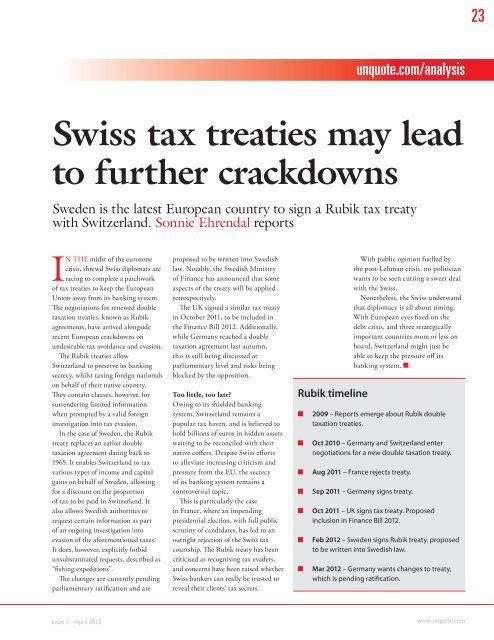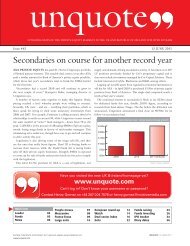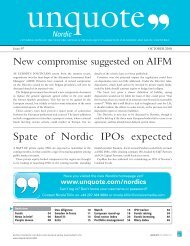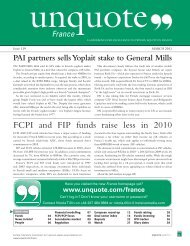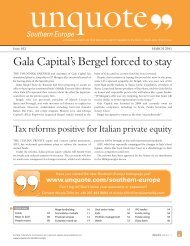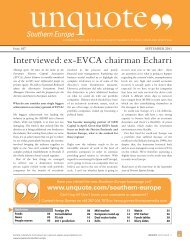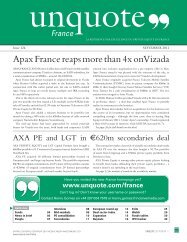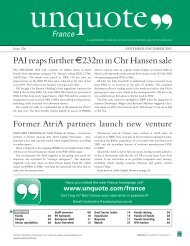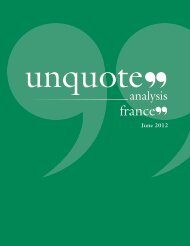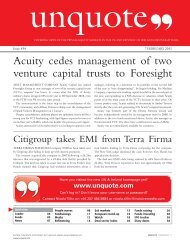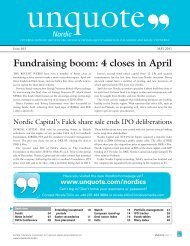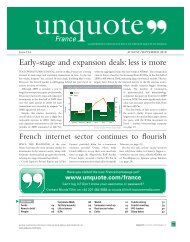digital edition of UK & Ireland unquote
digital edition of UK & Ireland unquote
digital edition of UK & Ireland unquote
You also want an ePaper? Increase the reach of your titles
YUMPU automatically turns print PDFs into web optimized ePapers that Google loves.
23<br />
<strong>unquote</strong>.com/analysis<br />
Swiss tax treaties may lead<br />
to further crackdowns<br />
Sweden is the latest European country to sign a Rubik tax treaty<br />
with Switzerland. Sonnie Ehrendal reports<br />
IN THE midst <strong>of</strong> the eurozone<br />
crisis, shrewd Swiss diplomats are<br />
racing to complete a patchwork<br />
<strong>of</strong> tax treaties to keep the European<br />
Union away from its banking system.<br />
The negotiations for renewed double<br />
taxation treaties, known as Rubik<br />
agreements, have arrived alongside<br />
recent European crackdowns on<br />
undesirable tax avoidance and evasion.<br />
The Rubik treaties allow<br />
Switzerland to preserve its banking<br />
secrecy, whilst taxing foreign nationals<br />
on behalf <strong>of</strong> their native country.<br />
They contain clauses, however, for<br />
surrendering limited information<br />
when prompted by a valid foreign<br />
investigation into tax evasion.<br />
In the case <strong>of</strong> Sweden, the Rubik<br />
treaty replaces an earlier double<br />
taxation agreement dating back to<br />
1965. It enables Switzerland to tax<br />
various types <strong>of</strong> income and capital<br />
gains on behalf <strong>of</strong> Sweden, allowing<br />
for a discount on the proportion<br />
<strong>of</strong> tax to be paid in Switzerland. It<br />
also allows Swedish authorities to<br />
request certain information as part<br />
<strong>of</strong> an ongoing investigation into<br />
evasion <strong>of</strong> the aforementioned taxes.<br />
It does, however, explicitly forbid<br />
unsubstantiated requests, described as<br />
“fishing exp<strong>edition</strong>s”.<br />
The changes are currently pending<br />
parliamentary ratification and are<br />
proposed to be written into Swedish<br />
law. Notably, the Swedish Ministry<br />
<strong>of</strong> Finance has announced that some<br />
aspects <strong>of</strong> the treaty will be applied<br />
retrospectively.<br />
The <strong>UK</strong> signed a similar tax treaty<br />
in October 2011, to be included in<br />
the Finance Bill 2012. Additionally,<br />
while Germany reached a double<br />
taxation agreement last autumn,<br />
this is still being discussed at<br />
parliamentary level and risks being<br />
blocked by the opposition.<br />
Too little, too late?<br />
Owing to its shielded banking<br />
system, Switzerland remains a<br />
popular tax haven, and is believed to<br />
hold billions <strong>of</strong> euros in hidden assets<br />
waiting to be reconciled with their<br />
native c<strong>of</strong>fers. Despite Swiss efforts<br />
to alleviate increasing criticism and<br />
pressure from the EU, the secrecy<br />
<strong>of</strong> its banking system remains a<br />
controversial topic.<br />
This is particularly the case<br />
in France, where an impending<br />
presidential election, with full public<br />
scrutiny <strong>of</strong> candidates, has led to an<br />
outright rejection <strong>of</strong> the Swiss tax<br />
courtship. The Rubik treaty has been<br />
criticised as recognising tax evaders,<br />
and concerns have been raised whether<br />
Swiss bankers can really be trusted to<br />
reveal their clients’ tax secrets.<br />
Rubik timeline<br />
■<br />
■<br />
■<br />
■<br />
■<br />
■<br />
■<br />
With public opinion fuelled by<br />
the post-Lehman crisis, no politician<br />
wants to be seen cutting a sweet deal<br />
with the Swiss.<br />
Nonetheless, the Swiss understand<br />
that diplomacy is all about timing.<br />
With European eyes fixed on the<br />
debt crisis, and three strategically<br />
important countries more or less on<br />
board, Switzerland might just be<br />
able to keep the pressure <strong>of</strong>f its<br />
banking system. <br />
2009 – Reports emerge about Rubik double<br />
taxation treaties.<br />
Oct 2010 – Germany and Switzerland enter<br />
negotiations for a new double taxation treaty.<br />
Aug 2011 – France rejects treaty.<br />
Sep 2011 – Germany signs treaty.<br />
Oct 2011 – <strong>UK</strong> signs tax treaty. Proposed<br />
inclusion in Finance Bill 2012.<br />
Feb 2012 – Sweden signs Rubik treaty, proposed<br />
to be written into Swedish law.<br />
Mar 2012 – Germany wants changes to treaty,<br />
which is pending ratification.<br />
Issue 3 – April 2012<br />
www.<strong>unquote</strong>.com


